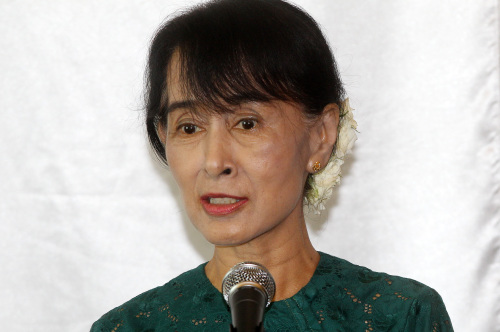YANGON ― Myanmar’s iconic opposition leader Aung San Suu Kyi is the key driver of the country’s political reform.
Suu Kyi entered parliament after her National League for Democracy party won a landslide victory in the April 1 by-elections.
The opposition party secured 43 of the 44 seats it contested in the landmark polls to carve out a presence in the country’s 664-member bicameral legislature still dominated by military figures.
The electoral win added momentum to ongoing political and economic reforms in the underdeveloped country and helped contain lingering skepticism about the nominally civilian government’s will for democratization.
Suu Kyi’s party won an overwhelming victory in the 1990 elections as well, with more than 80 percent of voter support. But the military refused to cede power and instead strengthened crackdowns on dissidents.
Since her release in November 2010 after spending 15 years under house arrest since 1989, she has gotten closer to the grassroots people that have suffered from poverty and social and political oppression.
The daughter of Myanmar’s independence hero Gen. Aung San, she began spearheading the democracy movement weeks after the military’s bloody crackdown on massive pro-democracy rallies in 1988.
Suu Kyi received a political science degree from Lady Shri Ram College in Indial in 1964, and flew to Britain to attend Oxford University. She earned her doctorate at Britain’s School of Oriental and African Studies in 1985.

Aung San Suu Kyi
After spending some three decades living outside the country as a scholar and then wife of British author Michael Aris, the iconic leader returned to Myanmar in 1988 to help her mother recover from a stroke.
Amid popular calls for democratic rule, people in the country wanted her to play an active leadership role. As she increasingly raised her voice against the dictatorship and human rights abuses, the military rulers put her under house arrest in July 1989.
Her confinement made her unable to travel to Norway to receive the Nobel Peace Prize in 1991. Her husband and son attended the award ceremony on her behalf.
Suu Kyi could not visit her ailing husband before he died in Britain of prostate cancer in 1999. When she was intermittently freed, Suu Kyi refused to go abroad, thinking that she might not be allowed to return home.
With her persistent calls for broad, fundamental reform and national reconciliation, the incumbent government led by Thein Sein, a former military general, has made strides toward democratic rule.
It has freed hundreds of political prisoners, eased media control, reached truces with ethnic rebels and held the by-elections that enabled Suu Kyi to enter parliament.
Also in a bold step toward economic reform, the country adopted a managed floating exchange rate system last month as its previous fixed mechanism had caused market distortions and dampened investor confidence.
The reform efforts have triggered competition among many countries over Myanmar’s vast reserves of oil, natural gas and other resources. Global powers including China have vied to court the country particularly for its geostrategic location next to the Indian Ocean and crucial sea lanes of communication.
By Song Sang-ho, Korea Herald correspondent
(
sshluck@heraldcorp.com)





![[Weekender] How DDP emerged as an icon of Seoul](http://res.heraldm.com/phpwas/restmb_idxmake.php?idx=645&simg=/content/image/2024/04/25/20240425050915_0.jpg&u=)
